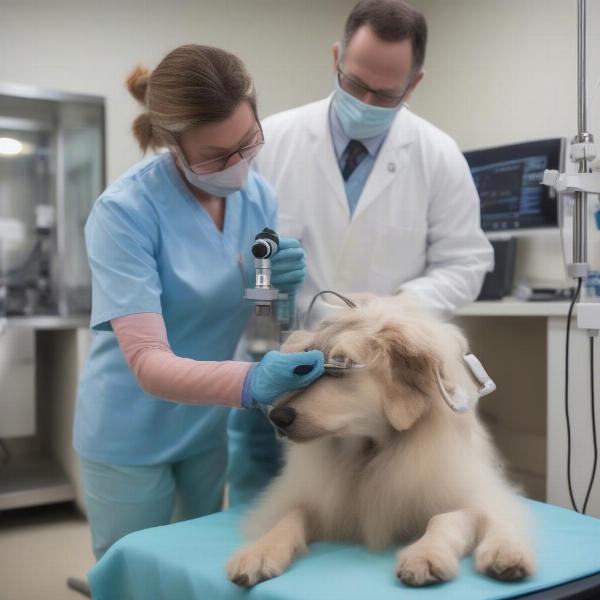Cataract surgery for dogs is a common procedure in the UK, offering a chance to restore vision and improve quality of life for affected canines. Understanding the costs involved, the procedure itself, and the aftercare required is crucial for any pet owner considering this option. This guide will provide you with a comprehensive overview of cataract surgery for dogs in the UK, covering everything from pre-operative assessments to post-surgery recovery.
Understanding Canine Cataracts and the Need for Surgery
Cataracts in dogs appear as a cloudy or opaque area in the lens of the eye, obstructing light from reaching the retina. This can lead to blurred vision, difficulty navigating, and even blindness. While some cataracts progress slowly, others develop rapidly. Surgery is the only effective treatment to restore vision in dogs with significant cataracts. The decision to pursue surgery depends on the severity of the cataract, the dog’s overall health, and the owner’s financial situation.
Cataract Surgery for Dogs Cost UK: Breaking Down the Expenses
The cost of cataract surgery for dogs in the UK can vary depending on several factors, including the complexity of the case, the surgeon’s experience, the location of the veterinary practice, and any additional tests or medications required. Generally, you can expect to pay between £2,500 and £4,000 per eye. This price typically includes the pre-operative examination, the surgery itself, anesthesia, pain medication, and post-operative check-ups.
What Factors Influence the Cost?
Several factors can influence the overall cost:
- Diagnostic testing: Pre-operative tests, such as blood work and eye ultrasounds, are essential to assess the dog’s overall health and the condition of the eye.
- Surgical technique: Phacoemulsification, a more advanced technique using ultrasound, can be slightly more expensive than extracapsular surgery.
- Medications: Post-operative medications, including eye drops and pain relievers, add to the overall cost.
- Complications: If complications arise during or after surgery, additional procedures or medications may be necessary, increasing the expense.
Preparing for Cataract Surgery: Pre-Operative Steps
Before the surgery, your vet will perform a thorough examination, including blood tests and eye ultrasounds, to evaluate your dog’s overall health and ensure they are a suitable candidate for surgery. You will receive detailed instructions regarding pre-operative care, including fasting requirements.
 A veterinarian examining a dog's eyes.
A veterinarian examining a dog's eyes.
Post-Operative Care: Ensuring a Smooth Recovery
Post-operative care is crucial for successful cataract surgery outcomes. Your dog will need to wear an Elizabethan collar (cone) to prevent them from rubbing or scratching their eyes. You’ll also need to administer eye drops regularly and attend follow-up appointments with your vet. Recovery typically takes several weeks, during which you’ll need to monitor your dog closely for any signs of complications.
Is Pet Insurance an Option?
Many pet insurance policies cover cataract surgery, which can significantly offset the cost. It’s essential to review your policy details and understand the coverage limits and exclusions. Getting pet insurance early, before any signs of cataracts appear, is often the most cost-effective approach.
Finding a Qualified Veterinary Ophthalmologist
Choosing a board-certified veterinary ophthalmologist is vital for your dog’s eye health. These specialists have extensive training and experience in performing cataract surgery and managing eye conditions. Your regular vet can usually refer you to a qualified ophthalmologist in your area.
Conclusion: Restoring Your Dog’s Sight
Cataract surgery for dogs cost UK can be a significant investment, but it can dramatically improve your dog’s quality of life. By understanding the procedure, the associated costs, and the importance of post-operative care, you can make an informed decision about whether cataract surgery is the right choice for your furry friend. Early diagnosis and prompt treatment are key to achieving the best possible outcomes.
FAQ: Common Questions about Cataract Surgery in Dogs
- How long does cataract surgery take? The surgery itself typically takes about an hour per eye.
- When will my dog regain vision? Most dogs begin to regain vision within a few days to a few weeks after surgery.
- Are there any risks associated with cataract surgery? As with any surgery, there are potential risks, including infection, inflammation, and retinal detachment.
- How can I make the recovery process easier for my dog? Following your vet’s post-operative instructions carefully, including administering medications and restricting activity, is crucial for a smooth recovery.
- Is cataract surgery always successful? While cataract surgery is generally successful in restoring vision, individual outcomes can vary.
- What are the signs of cataracts in dogs? Cloudy or milky appearance in the eye, difficulty navigating, and changes in behavior.
- How can I prevent cataracts in my dog? While some cataracts are hereditary, maintaining good overall health and regular veterinary checkups can help detect and manage eye problems early.
Related articles: golden eye drops dogs
About ILM Dog: ILM Dog is your trusted international resource for expert dog care advice. We cover a wide range of topics, from breed selection and health care to training, nutrition, grooming, and product recommendations. Whether you’re a first-time dog owner or a seasoned expert, ILM Dog offers practical tips and insights to help you provide the best possible care for your canine companion. Contact us for expert advice: Email: [email protected], Phone: +44 20-3965-8624.